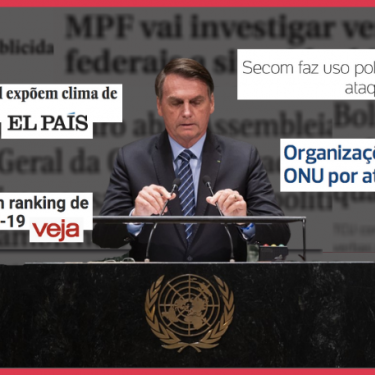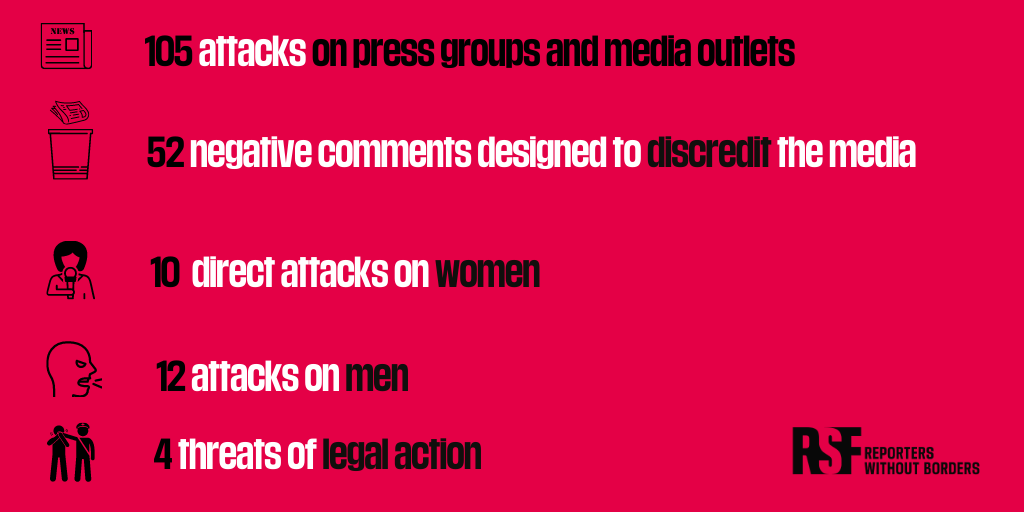Brazil quarterly analysis: media face censorship on multiple fronts

In the third in a series of quarterly assessments of press freedom violations in Brazil in 2020, Reporters Without Borders (RSF) examines how President Jair Bolsonaro’s strategy for smearing media outlets that annoy him affects the daily lives of journalists and infects other spheres of government.
The right to freedom of expression guaranteed by the constitution of the Brazilian federation has been in serious danger since Bolsonaro came to power in January 2019. The increasing hostility towards the media on the part of the president, his associates and some sections of the government has spread to other parts of the government and has led to new forms of censorship.
As well as analysing the organized and systematic nature of the Bolsonaro system’s attacks on media, RSF has examined other governmental methods for suppressing media freedom. In addition to these attacks, which have generated mistrust of journalists’ work, the media environment during the past quarter has been aggravated by disinformation, curbs on access to information (designed to control the public debate) and politicization of state communication mouthpieces.
In order to broaden this third assessment, RSF has interviewed three leading Brazilian media figures: Bia Barbosa, head of the NGO Intervozes and a member of the Brazilian Internet Steering Committee (CGI), the writer and journalist Bianca Santana who is an activist with the Coalizão Negra por Direitos, and Patrícia Campos Mello, a reporter for the newspaper Folha de São Paulo.

Total attacks of the "Bolsonaro system" against the press during the third quarter of 2020 (RSF figures)
Repeated attacks on journalists and the media in general by the “Bolsonaro system” continued in the third quarter of 2020, during which RSF recorded at least 27 by Bolsonaro himself, slightly more than the 21 in the second quarter. His sons once again repeated and hardened the attacks.
Federal parliamentary representative Eduardo Bolsonaro was the main perpetrator, with 79 attacks recorded in the third quarter, compared with 63 in the second, that is almost one attack per day. He was followed by Rio de Janeiro municipal councillor Carlos Bolsonaro with 19 attacks, compared with 44 in the second quarter, and by senator Flavio Bolsonaro with 21 attacks, against 47 in the second quarter.
Within the government, Damares Alves, minister of human rights, women and the family, is unquestionably the most hostile and vindictive towards the media, which she attacked 12 times in the third quarter of the year, compared with four in the second quarter, followed by Citizenship minister Onyx Lorenzoni with seven attacks, and just one in the second quarter, and Environment minister Ricardo Sales, with five attacks compared with two in the second quarter.
*See “How we compile our quarterly reports”
Stigmatization, misinformation and creation of a “common enemy”
Among the most serious attacks during this quarter occurred on 23 August when Bolsonaro was on an official visit in Brasilia. When a reporter from the O Globo newspaper group asked an awkward question about corruption directly related to his family, the president replied: “I’ll punch you in the mouth, motherfucker!” The episode provoked a wave of anger in the country, especially on social media where a number of leading figures and news organizations took up the question asked by the journalist.
On 24 August, the president described journalists as “fat asses” who had less chance of surviving Covid-19. On the same day he took a swipe at the black journalist Maria Júlia (Maju) Coutinho, presenter on TV Globo group, on Twitter, calling her a liar. His attack unleashed a torrent of misogynistic and racist threats and insults by Bolsonaro supporters on social media (follow the hashtag #MajuMentirosa).
In an address full of falsehoods to the UN General Assembly on 22 September, Bolsonaro repeated the allegation he had made several times in the course of the year, that sections of the Brazilian media had “politicized the virus by spreading panic among the population…and almost brought social chaos to the country”.
According to Bianca Santana, targeted in an attack by the president on 28 May, “there is a clear intent to spin a narrative designed to manipulate the public and make them believe the media cannot be trusted…The intent is that, by attacking journalists, I am encouraging them to be attacked in order to ruin their reputation once and for all and ensure that I no longer need to answer questions or respond to criticism in public”.
His aggressive speech has had an effect on the work of journalists. “Part of the population has become openly hostile to the media,” said Patrícia Campos Mello, who has herself been the target of a campaign of harassment and intimidation orchestrated by the president’s sons. “There are some who believe government’s talk about ‘fake news’ and ‘the communist press’. When I’m interviewing people I sometimes hear them say ‘you are from the media so you must be a communist!’
“When photoshopped memes of me were being spread around, I stopped going out to report on demonstrations. This is ridiculous, our country is not at war and it should be normal to cover democratic demonstrations.”
In Santana’s view, the attacks “change our behaviour, curtail our freedom … They have a direct impact on the work of the targeted journalists and the public stances they take”.
Access to information increasingly limited
The blocking of journalists on social media by government agents, already reported in the first quarter, persists, as detailed in a recent report by the Brazilian Association of Investigative Journalism. Some members of the government, such as the former education minister Abraham Weintraub, have boasted publicly about it.
The media have had increasing difficulty in obtaining information from the authorities. Since taking office in January 2019, Bolsonaro’s government has imposed at least 13 measures aimed at restricting access to information, as detailed in the Folha de Sao Paulo.
“This government ranks high among those refusing access to information,” said Mello. “It gives hundreds of false excuses for not responding to such requests. It does not see for its part that it is a function of an elected government to be publicly accountable.”
The Covid-19 health crisis has led to a growing lack of transparency in government affairs (see the analysis by Transparency International Brazil which gives a state-by-state breakdown of how transparent the authorities have been in the fight against coronavirus).
The Rio de Janeiro municipality has not only been not accountable but also directly obstructed the work of the media on the pandemic in early September, when the Globo group’s regional station RJ2 reported that the mayor, Marcelo Crivella, a close associate of Bolsonaro’s, set up WhatsApp message groups of city employees to keep watch outside the city’s hospitals to prevent journalists from carrying out interviews and referring to the failures of the health service.
Politicization of official media
In its report after carrying out an audit in August, the Brazilian Court of Auditors (Tribunal de Contas da União) pointed out the lack of transparency and technical criteria in the allocation of official publicity produced by the government, highlighting the preferential treatment given to television stations that closely followed the government line, in particular the stations run by the groups SBT and Record.
The TCU criticized the presidential communications secretariat Secom, which is responsible for distributing funds of this kind, for the inequitable and impenetrable manner in which it manages the resources. Since June, the awarding of Secom funds has been taken over by the new communications ministry. The ministry had been abolished in 2016 when its remit was taken over by the ministry of science, technology and innovation. Its revival was announced in June this year and took effect in September.
The appointment of Fábio Faria, the son-in-law of SBT group owner Silvio Santos, a close associate of Bolsonaro’s, as head of the ministry was a further cause for concern.
“The ministry of communications has again become a political bargaining chip, only with much more power,” said Bia Barbosa. “Now it’s not just broadcasting licences and permits that are allocated to bolster political ties, but all government advertising.”
Secom itself, which was behind at least five attacks on the media in the third quarter, including using the expression “the rotten press” and making groundless allegations of “fake news” against news outlets that criticized the executive, is often singled out for its lack of integrity and accused of being an instrument of government propaganda.
The government’s interference has also been significant within the Empresa Brasil de Comunicação (EBC), the entity in charge of Brazil’s main state media outlets. In September, a commission consisting of EBC employees and representatives of media unions in several of the country’s states published a report listing no fewer than 138 complaints about “censorship” or “interference” by the government from January 2019 to July 2020. The report said the most censored subjects during this period were politics and human rights including, for example, suppression of content linked to the murder of Marielle Franco and Anderson Gomes, violations of the rights of indigenous populations, the ban on using sources such as Amnesty International and Human Rights Watch, and over-protection of government ministers and the president.
This interference in the EBC reduces its autonomy and independence, according to Bia Barbosa, who said: “Journalists at Rádio Nacional – one of the EBC’s communication outlets – who asked questions at health ministry press conferences that embarrassed the ministry’s staff or the minister himself were barred from these press conferences. So you have very clear measures, as regards journalistic practices, that are taken directly by the president’s office and the federal government.”
Judicial censorship gains ground
A feature of the third quarter was the proliferation of improper judicial proceedings against journalists and news organizations, mostly brought by government representatives or associates of the president.
In one of the most significant cases, a judge in Rio State ordered the newspaper Jornal GGN and its journalists Patricia Faermann and Luis Nassif to withdraw 11 articles or face a fine of 10,000 reals. The articles dealt with the improper activities by the BTG Pactual bank – whose founders include Economy Minister Paulo Guedes – in São Paulo and in Chile.
Justice officials upheld a complaint by BTG Pactual that the newspaper’s investigation included confidential information and the 11 articles are still suppressed.
On 4 September, justice officials in the state of Rio de Janeiro suppressed a series of reports by TV Globo on investigations under way into the president’s son Flávio, suspected of misappropriation of public funds and corruption while he was a member of parliament for the state.
On the same day, the journalist Reinaldo Azevedo, a commentator for the newspaper Folha de São Paulo and a presenter on the radio station BandNews FM, was ordered to pay 35,000 reals in damages to Deltan Dallagnol, chief prosecutor in the complex Lava Jato corruption investigation. The probe was launched in 2014 into a corruption and money-laundering scheme involving the state-owned Petrobras oil company. Dallagnol accused the journalist of besmirching his honour in an editorial.
On 21 September, Human Rights, Women and Family Minister Alves, embarrassed by disclosures about her mishandling of a controversy over a minor’s abortion, used her personal Twitter account to threaten the newspaper Folha de Sao Paulo and the news platform UOL with legal proceedings.
Against this background and faced with these new forms of indirect censorship fuelled by a highly polarized political atmosphere, the Brazilian media have challenges ahead and must reinvent themselves in order to restore public confidence. The challenges are huge and are not new. The response must lie in boosting journalism, particularly quality journalism, by strengthening the independence and diversity of the media
Brazil is ranked 107th in the 2020 World Press Freedom Index compiled by RSF.



